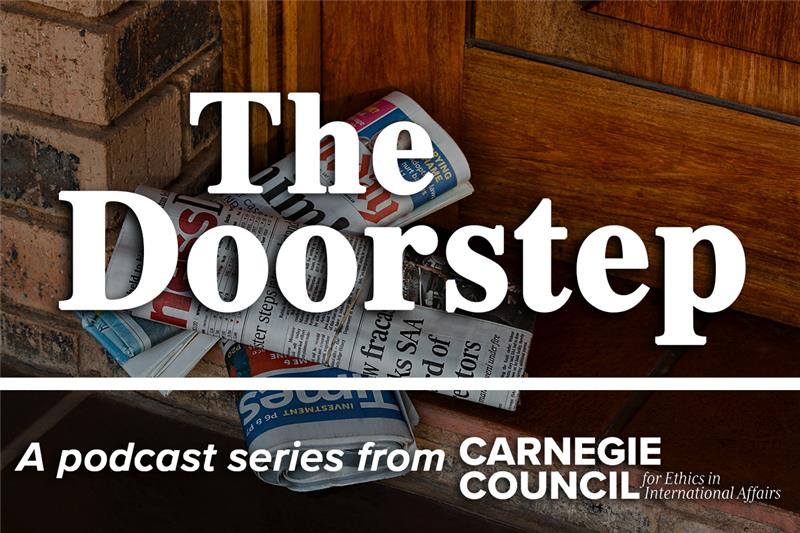I am so excited to share, The Doorstep, a new international news podcast that aims to reach across the borderless internet and talk about the ways global affairs touch Main Street U.S.A. With my co-host, Nicholas Gvosdev, Senior Fellow at the Carnegie Council for International Affairs and professor of National Security Affairs at the U.S. Naval War College, and the support of the Carnegie Council, I plan to explore underreported stories that have a big impact on our everyday lives and highlight the news you may have missed in our whirlwind, whiplash news cycle. Every two weeks, Nick and I, along with roundtable guests, will finds news you need to know and discuss the U.S.’s position in the world with a different regional focus each time.
In our first podcast, out on September 25, Nick and I reviewed the jaw dropping financial scandal that few noticed. In the FinCen Files, Buzzfeed reporters detailed how big banks laundered trillions of dollars on behalf of terrorists and drug cartels – and got away with it. As Nick noted, “major financial institutions are really in the business not of securing the financial networks for the public good, but they’re looking at how they can make money, and they’re not going to ask too many questions about where the money is coming from.” This then adversely affects the American consumer.
We also spoke about the second wave of the novel coronavirus spread in Europe, and the beginnings of a second wave in the United States. We discussed Europe as harbinger of things to come in the U.S. and took a look at Belarus’ contested presidential election. Nick aptly stated, “When people look at a place like Belarus, before it would be to say, ‘Well that’ just one of those quirky East European countries we don’t know too much about. That’s just something that happens in that part of the world.’ But no, this is in a way a canary in the coal mine.” We discussed how the protests in Belarus are part of a larger phenomenon of global frustration, one that is further intensified by the pandemic.
As we looked ahead to the Trump-Biden debate, we discussed if foreign policy might make it into the sparring. Looking at Susan Rice’s New York Times op-ed, and Aly Wyne’s discussion in a webinar at Carnegie Council on great-power competition, it becomes evident that in order for the U.S. to project power on the world stage, its internal domestic health has to be strengthened. How is this possible in the face of multiple threats: a major health crisis, rising unemployment, food insecurity, natural disasters, and more?
Specifically looking at China, if we don’t fix internal issues, how do we position ourselves to win in a trade war or other perhaps more dire confrontation? We discussed the dissonance between the U.S. and China and how it is being felt not just in our wallets with rising prices, but also in our social media use, specifically with the the Tik Tok ban/not a ban. This story was one of the most watched by a younger audience, many of whom were not aware the platform was owned by a Chinese company but who were quick to react to a medium of their self-expression potentially disappearing.
Some of these issues discussed in our first podcast, fed into our second podcast out today, especially with foreign policy being addressed in the Pence-Harris vice presidential debate. The two candidates offered a stark contrast in their view of American in the world, one as a strongman, the other as a friend.
We spoke with special guest, Politico foreign correspondent, Nahal Toosi, about these diverging views of the U.S. in the world and what it means for us in our day-to-day lives. Nahal’s most recent Politico piece, Joe Biden’s First Diplomatic Fight Will Be At Home, looks at how “progressive activists are regularly talking with Biden’s campaign in a bid to shape the Democrat’s foreign and national security policy agendas,” and what that may mean if Biden takes office in January 2021. We also discussed what a Trump Season 2 foreign policy might look like, and actual similarities between Biden and Trump on certain issues like a strong China policy. I predict we will be speaking much more about Nahal’s idea of ‘omnipolicy’ (she her latest Global Translations newsletter)and how a foreign policy platform like Biden’s can include things like raising the minimum wage and reforming the criminal justice system.
All of this ofcourse can be upended by the health of the two candidates, both well into their 70s, and President Trump currently recovering from COVID. We discussed the spy games around the President’s health, and what they world is saying post the first presidential debate.
Some headlines I was fascinated to read, and we think it important to share with our idea of the borderless internet (credit BBC).
As The Times in the UK wrote, “The clearest loser from the first presidential debate between Donald Trump and Joe Biden was America.”
“Chaotic, childish, gruelling” – that’s how French newspaper Libération described Tuesday’s debate.
Der Spiegel’s analysis of the debate is headlined “A TV duel like a car accident”.
The key takeaway is that Europe is watching us much more closely than we are watching Europe at the moment. But two particular issues should be resonating a bit more. The first is the resurgence in aggression and violence between Armenia and Azerbaijan over the tiny territory (about the size of Delaware) of Nagorno-Karabakh. It seems the U.S. will be sitting at the table to find a resolution to a conflict some say might lead to an all out regional war with players like Turkey, Russia and Iran in the mix. How this will play out over the next couple of weeks will be very important to assessing our diplomatic role in the world.
Similarly, Europe’s refugee crisis is a yet another harbinger of our own immigration crisis. Although the foreign born population of the U.S. is only about 13%, the idea that immigrants are taking American jobs and consequent threats to security hovers large in the current collective imagination. What must change in our understanding if we are to create new and more just policies? Tune in to hear our discussion!
We look forward to continuing the conversation with you. Please reach out @tatianaserafin or @DoorstepPodcast!


